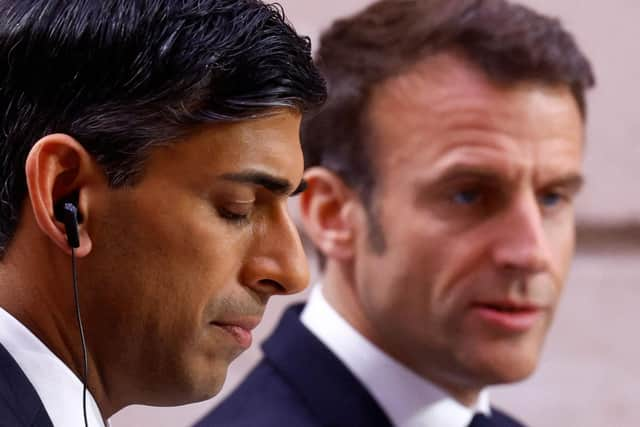Sunak faces test of economic credibility on growth in next week's budget
Yesterday the Prime Minister got one. A deal with France’s President, Emmanuel Macron, saw the UK stump up almost £500 million in funding which may actually have an impact on the issue of small boat crossings, one which successive governments have barely made a dent in.
This comes after another win by agreeing the Windsor Framework with the European Union, which, with the support of unionist parties in Northern Ireland, could also have a meaningful effect on the stalemate across the Irish Sea.
Advertisement
Hide AdAdvertisement
Hide AdHowever, despite these victories which could see a bounce in polling, Mr Sunak’s credibility and focus has arguably come from the economy, with Wednesday’s budget set to be vital.


Though his predecessor Liz Truss was roundly thwarted in her quest for “growth at all costs”, think tanks and businesses are clear that there is a middle ground between Singapore-on-Thames and a country that seems now petrified to cut taxes for fear of market turmoil.
This week’s announcement of the delay of HS2 by two years because of inflationary pressures does give the indication that Jeremy Hunt’s budget is set to be a mixed bag for businesses and for growth.
On the one hand taxes are going up, with corporation tax set to rise from 19 to 25 per cent, and some key incentives such as the “super deduction”, which allows firms to invest in lieu of paying tax, set to end.
Advertisement
Hide AdAdvertisement
Hide AdOn top of this, just as the UK becomes less attractive to invest in, the US and the EU are becoming more so, with Joe Biden’s Inflation Reduction Act sparking concerns that the huge tax subsidies on green energy could tempt investment away from Europe, and the EU reacting to this by drawing up their own plans to compete with America.
The risk for the UK is that if the Chancellor does not provide some investment incentives for businesses, Britain will be stuck stagnating between two huge economies seeking growth.
Henri Murison, Chief Executive of the Northern Powerhouse Partnership, said: “We want to see an end to short-sighted Treasury thinking, that focuses on a debt-to-GDP ratio target – which is badly designed -rather than delivering an ambitious, long-term vision for higher growth and productivity.
“My personal plea to the Chancellor is to change the spending rules to separate out investment from day-to-day spending.”
Advertisement
Hide AdAdvertisement
Hide AdFor many firms, Wednesday’s budget may not quite be a last-chance saloon to get the economy moving, but it will certainly send a strong signal to companies on where they should look to invest.
Soundings from the Treasury indicate that there will be a lot of tinkering around the edges of the economy in order to boost growth.
Reforms to pensions and retirement age, along with tax subsidies for older workers would boost the number of people in the workforce, and, as Jeremy Hunt has said “make work worth your while”.
Similarly, reforms to childcare could get more parents back into the workforce and relieve pressures on incomes which may stop them sending money in the economy.
Advertisement
Hide AdAdvertisement
Hide AdSome reforms to business taxes are expected, but not at the levels that many are calling for, with the preferred outcome of “full expensing” of investment costs deemed very expensive for the Treasury.
Last night the Treasury revealed that the Chancellor will announce £20 billion of funding to create 50,000 skilled jobs in new green technology such as carbon capture and storage.
Luke Myer, a research fellow at IPPR North commented: “The government is running out of time to move the dial on its promises to northerners before the next general election, so this Budget needs to see the chancellor get serious about levelling up.
“46,000 future jobs could be created through the North’s decarbonisation by 2030 and the chancellor holds a key to unlocking them. But as well as investing to create good, green northern jobs, he will need to ensure that they are accessible to local people.”
Advertisement
Hide AdAdvertisement
Hide AdUncharacteristically for Whitehall, the Treasury also looks set to devolve some of its powers back to regions including Yorkshire.
The Government’s investment zone scheme is among a raft of policies set to be announced in the budget, and it is understood that there is set to be at least one in Yorkshire, with insiders predicting that Sheffield will see its bid accepted.
These investment zones, which have changed guise repeatedly in recent months, are set to be less about “regeneration”, as they were when first announced by Michael Gove, are more about cutting taxes and boosting growth, as they were under Liz Truss, with areas set to be given a “menu” of powers to choose from which would then be agreed with Whitehall.
The Greater Manchester and West Midlands trailblazer devolution deals could also be announced either in the Chancellor’s speech or in the immediate aftermath late next week, after agreements between Mr Gove and Mr Hunt’s department over the money that the combined authorities will receive.
Advertisement
Hide AdAdvertisement
Hide AdMeanwhile, all of these adjustments to the economy will have to be set against what the Chancellor and Mr Sunak think they can give to those calling for bigger budgets, bigger paycheques and lower bills.
The Whitehall department shouting loudest about spending is defence, with Ben Wallace vocal about an inflation-matching increase, but one that he may be unlikely to get.
Similarly negotiations over pay with striking public sector workers continue to rumble on.
Meanwhile, the costs of those struggling with energy bills are set to be kept lower than they would if the market were left to its own devices, with the Energy Price Guarantee set to be extended for a further three months.
Mr Hunt and Mr Sunak’s budget will be the tone-setter for businesses and the public, as the Government fights back against Labour’s plans for growth announced in recent weeks.